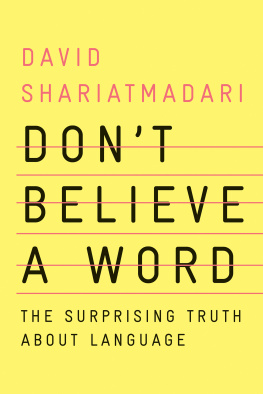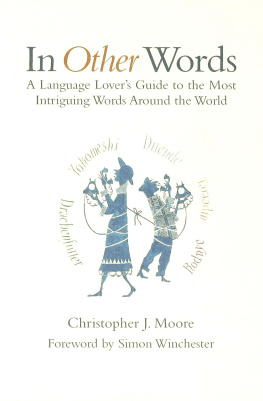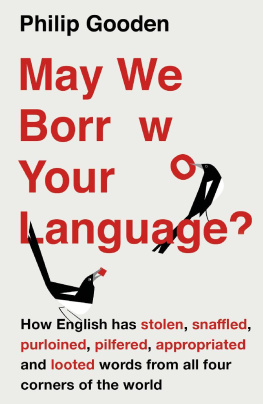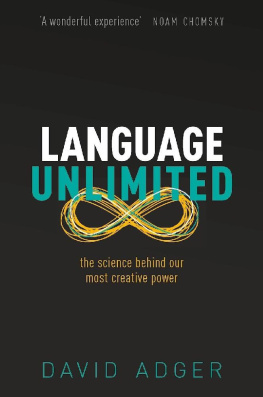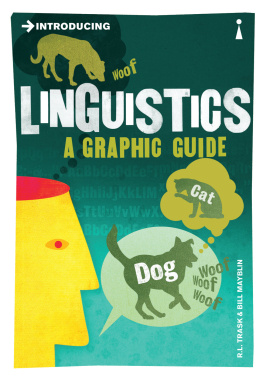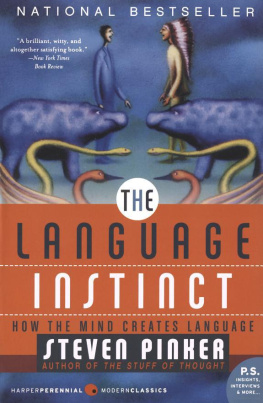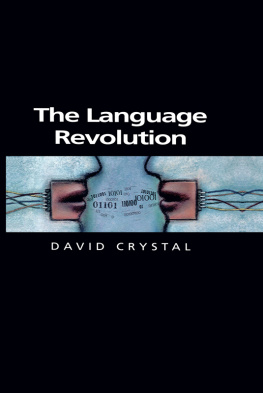Contents
Guide

DONT BELIEVE
A WORD
The Surprising Truth About Language
DAVID SHARIATMADARI

For Arfa
CONTENTS
Is anything quite so familiar, yet so mysterious as language? It fills our lives, often from the moment we wake up, to last thing at night. Most of us use it without thinking about it. But most of us also have only the vaguest idea of what it really is, and how it works.
It is something closecloser than anything, really: in our lungs and on our lips. But it remains far from our grasp in terms of understanding. It is the box of magic tricks inside every one of us. It is also an inescapable trap: we can only think and talk about language by using it. Language is deployed to wonder about itself, to scrutinize itself, to praise and deplore itself. No surprise, then, that amateur explorers sometimes feel as though they are lost in a hall of mirrors.
Even so, it remains an obsession. Today, an ordinary Tuesday, I searched Google News for words and language. Among the hundreds of headlines from around the world:
From titanic success to Mad Max: how language around Brexit changed
The murky linguistics of consent
Danish minister to migrants: learn the language or pay for your own interpreter
10 German words becoming extinct thanks to English
Climate change can also transform language
How the lefts war on words manipulates your mind
The generation who cant remember life before mobiles are not just social media obsessed, they speak their own language. From kitten-fishing to adulting, heres how to speak millennial!
There appears to be an almost insatiable appetite for linguistic debate. A fascination driven in part, perhaps, by the lack of satisfying explanations. Why do millennials speak their own language? Do the words they choose reflect the fact that they are superficial, lazy, addicted to technology? How can you protect a language against outside influence? Does the language we use to talk about climate change, or Brexit, change the way we think about them? Are words responsible for directing our thoughts, or is it the other way around? Who decides what a word actually means?
There are good reasons language is such a battleground and source of frustration: it is also a source of delight, of self-esteem and solidarity. Great poets and writersthe ones who can shape language in elegant and startling waysare loved by millions and can find themselves richly rewarded. Song lyrics capture the spirit of the times and stay with people their whole lives. Lullabies are imbibed with mothers milk, and words and stories we associate with childhood are intimately linked to our sense of self. Language is used for social differentiation: think of all the effort people go to in order to expunge the wrong kinds of words or sounds from their speech. Conversely, theres pride in local language, in slang, in words that are markers of identity. Imagine youre homesick in a far-off country, surrounded by strangers. Whats the feeling you get when you overhear someone speaking your languagenot only that, but in your accent, from precisely your part of the world?
Something as precious as this is bound to be fought over.
And puzzled over. Our curiosity about language has given rise to a bewildering variety of explanations, from myth, to folklore, to theory. That theorylinguisticsrepresents our most advanced attempt at decoding this familiar, mysterious thing. Experts views are far from settled. But the arguments are better informed than theyve ever been.
The journey toward this state of enlightenment began thousands of years ago. The Hebrew Bible represents the starting point for Western understanding of language. Adam, the first man, was given the power to create words: Now the Lord God had formed out of the ground all the wild animals and all the birds in the sky. He brought them to the man to see what he would name them; and whatever the man called each living creature, that was its name (Genesis 2:19). Later, when Adams descendants challenged his power by building the Tower of Babel, God said: If as one people speaking the same language they have begun to do this, then nothing they plan to do will be impossible for them. Come, let us go down and confuse their language so they will not understand each other (Genesis 11:67).
The idea that we all once spoke in the same way is found across cultures. The ancient Greeks thought that there was perfect linguistic unity under Zeus. But then his son Hermes taught humans their many languages, and they began to fight. The Aztecs believed that only one man and one woman survived a great flood in a hollowed-out tree. They had children, who were all dumb, until a dove came down and taught each one to speak differently.
The sheer variety of languages was obviously a preoccupation. Listening to people say things you cant understand is a uniquely strange and maddening experience. You might be able to interpret emotion and tone, but otherwise it is an undifferentiated mishmash of syllables, and you are frozen out. Mutual incomprehension serves nobody well. It must, therefore, be the result of a mistake, or a sin. How much easier would things be if we all understood each other? (It makes sense that to speak the same language has become an idiom suggesting recognition, empathy and cooperation.)
The many things languages have in common were equally intriguing. Over the centuries, scholars, traders and conquerors noted similarities among words that could not have been coincidental. An English judge in India, William Jones, made these observations explicit in a famous lecture to the Asiatic Society of Bengal in 1786. Jones had identified correspondences between Sanskrit, Greek and Latin, among other languages, and recognized them as a family, theorizing that they must have evolved from a common ancestor. For example, the Sanskrit for foot is p da , in Latin its pes , in ancient Greek its pos . These related languages were later given the label Indo-European, and their hypothetical common ancestor named Proto-Indo-European (the Proto-Indo-European for foot is p ds ). The family includes siblings such as German and Dutch, as well as more distant cousins like Spanish and Nepali. The parents are the older, classical languages. But what does it mean for languages to be mothers, sisters or daughters to one another? Is each one as separate as an individual human being, born at a particular moment in time and in turn giving birth to its own offspring?
The family-tree analogy is tempting, but obscures some important facts. As the linguists of the nineteenth century pored over data from those connected Indo-European languages, they began to understand that the biological model didnt always fit the evidence. The skin around languages was permeable: they tended to bleed into one another. And it gradually became clear that a language can only ever be a snapshot, a single slice of time in the history of a community of speakers.
The attention of scholars turned from language history to language in the present. What were the relationships between different components of language? What was its structure? There seemed to be several interlocking layers. First, soundsphonemes (like b, d and g)then groups of soundsmorphemes, which built words (like mis-, -ness and -ing). These layers were called phonology and morphology. Morphemes and words carried meaning, which was itself another layer, called semantics. The order of words in a sentence followed certain rules of syntax.

